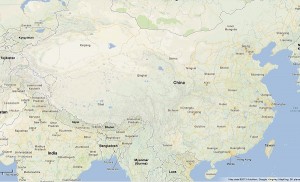China says one-fifth of its farmland is polluted

The report, previously deemed so sensitive it was classified as a state secret, names the heavy metals cadmium, nickel and arsenic as the top contaminants.
It adds to widespread doubts about the safety of China’s farm produce and confirms suspicions about the dire state of its soil following more than two decades of explosive industrial growth, the overuse of farm chemicals and minimal environmental protection.
It also points to health risks that, in the case of heavy metals, can take decades to emerge after the first exposure. Already, health advocates have identified several “cancer villages” in China near factories suspected of polluting the environment where they say cancer rates are above the national average.
The soil survey was conducted from 2005 until last year, and showed contamination in 16.1 percent of China’s soil overall and 19.4 percent of its arable land, according to a summary released late Thursday by China’s Environmental Protection Ministry and its Land and Resources Ministry.
“The overall condition of the Chinese soil allows no optimism,” the report said. Some regions suffer serious soil pollution, worrying farm land quality and “prominent problems” with deserted industrial and mining land, it said. Contamination ranged from “slight,” which indicated up to twice the safe level, to “severe.”
Article continues after this advertisementThe report’s release shows China’s authoritarian government responding to growing public anger at pollution with more openness, but only on its own terms and pace. Early last year, Beijing-based lawyer Dong Zhengwei had demanded that the government release the soil findings, but was initially rebuffed by the environment ministry, which cited rules barring release of “state secrets.”
Article continues after this advertisementThat led to criticism from the Chinese public, and even from some arms of the state media. The Communist Party-run People’s Daily declared that, “Covering this up only makes people think: We’re being lied to.” The ministry later acknowledged the information should be shared, said Dong, who attributed this week’s release of the report to public pressure.
Without a release of the information, “the public anger would get stronger, and soil contamination would deteriorate, while news of cancer villages and poisonous rice would continue to spring up,” Dong, an anti-trust lawyer, said in an interview Friday.
Because some of the samples in the survey, which is the first of its kind in China, date back nearly a decade, the results would likely be much worse if tests were taken today, Dong said.
He said the government should conduct soil surveys and release the results on an annual basis and respond with immediate remediation measures.
China’s leaders have said they are determined to tackle the country’s pollution problem, though the threat to soil has so far been overshadowed by public alarm at smog and water contamination. However, recent scandals of tainted rice and crops have begun to shift attention to soil.
A key concern among scientists is cadmium, a carcinogenic metal that can cause kidney damage and other health problems and is absorbed by rice, the country’s staple grain.
Last May, authorities launched an investigation into rice mills in southern China after tests found almost half of the supplies sold in Guangzhou, a major city, were contaminated with cadmium.
In early 2013, the newspaper Nanfang Daily reported that tens of thousands of tons of cadmium-tainted rice had been sold to noodle makers in southern China since 2009. It said government inspectors declared it fit only for production of non-food goods such as industrial alcohol but a trader sold most of the rice to food processors anyway.
The worst pollution detailed in this week’s report centers around the country’s most industrialized regions, the Yangtse and Pearl River deltas in southern China, as well heavily industrial portions of the northeast.
The summary of findings gave no detailed breakdown of contamination by region. It said most of the contaminated soil had levels of pollutants ranging from just above the allowable limit to double the limit, while for 1.1 percent of the country’s soil the contaminants were at five times the safety limit or more.
Lu Yizhong, a soil contamination expert at China Agricultural University, said soil surveys must become more frequent, with detailed results published regularly. More legislation is needed to control the problem, he said.
Warning that food safety was emerging as a “thorny issue” for China, Lu said the effects of the gradual accumulation of toxic metals in the bodies of people who eat contaminated produce can take years to unfold. “Sometime it can take 10 to 30 years to develop serious disease.”
China must step up efforts to monitor and regulate soil contamination “otherwise the speed of new contamination will surely outpace efforts to rein it back,” he said.
RELATED STORIES
China to tighten rules against pollution